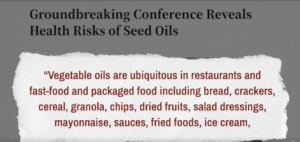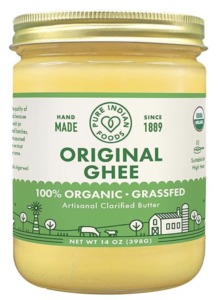 Resiliency and quick recovery from challenges is certainly possible. However, human beings are not a set of organs and systems working separately. Like an orchestra, if one instrument is out of tune, the harmony of the whole piece will suffer.
Resiliency and quick recovery from challenges is certainly possible. However, human beings are not a set of organs and systems working separately. Like an orchestra, if one instrument is out of tune, the harmony of the whole piece will suffer.
Similarly, if we are trying to transform our emotional lives and manage stressful situations, we need the support of a healthy body. Many factors, including epigenetic alterations, can disrupt our overall wellbeing, and a crucial one is inflammation.
Vegetable oils like canola oil, corn oil, sunflower oil, soybean oil, grapeseed oil, palm and peanut oil have become increasingly popular in recent decades. However, there is growing evidence that these highly processed vegetable oils may be harmful to our health. They may, in fact, be contributing to chronic health conditions like obesity, inflammation and chronic pain.
Unfortunately, “Vegetable oils are ubiquitous in restaurants, fast-food and packaged food including bread, crackers, cereal, granola, chips, dried fruits, salad dressings, mayonnaise, sauces, fried foods, ice cream, baked goods, and other snacks.”
Vegetable oils are high in PUFA – Poly Unsaturated Fatty Acids – and PUFA overload causes inflammatory disease and toxicity, which leads to fatigue and overeating.

The toxicity of vegetable oils is a topic I have been researching for a long time. When we came back to the US from living in Paris, France, for a number of years, I was intrigued by why these oils were listed as ingredients in most packaged foods, and why most restaurant used canola or sunflower oil exclusively, instead of healthy options, like organic olive oil.
Canola oil, called rapeseed oil, for example, is banned in Europe, so I started researching the reasons why it is so harmful and still widely used in America.
What follows is what I discovered.
The History of Seed Oils & of Canola Oil
Kashif Khan has written an excellent and very concise description of the history of seed oils. In The History Behind Seed Oils and the corruption that brought industrial waste into our kitchens, he dives into how “William Procter and James Gamble (sound familiar?), saw a major opportunity to cut costs by using cottonseed oil in their products. This resulted in cotton producers having a significant amount of toxic byproducts from cotton production leftover, with nothing to do with it……”
Canola oil is derived from the seeds of the rape plant, that’s why it is also called rapeseed oil. It was originally developed in World War II to lubricate ships and steam engines. During World War II the US government asked Canada to increase their production of rapeseed oil to help with the war effort.
At the end of World War II demand for this rapeseed oil dropped precipitously and Canada needed to find a way to keep selling it since it had put so many resources into producing it high amounts. This unmodified rapeseed oil is toxic for humans containing significant amounts of a mono unsaturated fat called erucic acid which seems to be damaging for the heart.
In 1980 scientists finally succeeded in genetically modifying the seeds from these rape plants to make their oil lower in erucic acid. That is how canola oil was born.
Canola is actually an acronym that stands for Canadian oil low acid. Today the United States is one of the highest consumers of canola oil.
Unfortunately, the Food and Drug Administration (FDA) has approved it as Generally Recognized as Safe (GRAS) status. However, there are multiple studies in both animal and human models showing clearly that seed oils are harmful for us. Vegetable oils are highly refined so they are exposed to many extracting agents that are carcinogenic like benzene hexane and heated to high temperatures leading to oxidation of these fragile oils. That’s why they are toxic.
Why are Vegetable Oils Harmful to our Health?
There is a growing body of research and evidence suggesting that these highly processed vegetable oils have potential negative impacts on our health because they are often high in omega-6 fatty acids and they are processed using methods like refining, bleaching, and deodorizing, which can lead to the formation of harmful compounds. [3]
Too much omega-6 fatty acids has been linked to inflammation and oxidative stress, which are a key factor in the development of various chronic diseases, including heart disease, diabetes, and obesity. [4]
Seed oils can undergo oxidation when exposed to heat during processing or cooking. This oxidation can lead to the formation of harmful compounds called free radicals, which may contribute to various health issues
Additionally, to extract the oil from the seeds they use hexane, a solvent used in gasoline. They do this because it is a cost-effective method that helps manufacturers obtain higher yields of oil from the raw materials. The process typically involves crushing the seeds or vegetables to release the oil, followed by the application of hexane to extract the oil from the plant material.
The Use of Hexane in Vegetable Oils
Hexane is naturally found in petroleum and crude oil and in natural gas. It is a neurotoxin that causes axonal degeneration and demyelination affecting nerve conduction. [1] [2]
It is used in stain removers, contact cement, glue, art paints & gasoline. It is the primary solvent used to extract industrial & vegetable oil from soybean, canola, corn, sunflower, cottonseed, rice bran and peanut oil.
After extraction, the oil-hexane mixture is heated to evaporate the hexane, leaving behind the extracted oil. If you are exposed to hexane over a long period of time, it may cause damage to your nervous system.
How Seed Oil Consumption Turns Body Fat into a Toxin- Generating Machine
In this video, Dr. Catherine Shanahan describes “how unstable fatty acids from seed oils can build up in our body fat, and why that makes us gain weight and develop inflammatory disease. Your body fat is designed to energize you all day, and prevent you from getting “hangry” ( being angry & irritable due to hunger) and needing food to function. When body fat fails to do its job, we become pathologically hungry and we crave the very foods that harm us the most.
“
Healthy Oils we can use Safely
For healthier cooking options select well-sourced, organic, high-quality oils, 
rich with omega-3 content, such as olive and avocado oils.
Organic Extra Virgin Olive Oil – EVOO
Olive oil, also referred to as “liquid gold,” is made from olives and comes from different parts of the world such as Greece, Morocco, Tunisia, Spain, and Portugal. Italy is the largest exporter.
There are many different types of olive oil available at the grocery store: Extra virgin, virgin light, and pure. Stay away from olive oil that says “pure” on the label. It is the lowest quality and could even be mixed with other oils.
Extra virgin is the gold standard. It means there are no defects in the olives used to produce the oil. It is the least processed and contains the most nutrients (antioxidants, polyphenols, tocopherols, etc.). Make sure the oil is cold-pressed, which means it’s the least processed. If the oil smells rancid or like crayons, it has gone bad.
My favorite brand is Fandango. It comes from an olive family farm in California. They use neither pesticides to manage the weeds and critters nor petroleum-based synthetic fertilizers. It tastes great and it is organic and extra virgin.
It comes in smaller 13 fl oz so if you use it regularly, it will not go rancid as the ones in bigger bottles do. If you order a couple of bottles, the shipment is free.
Organic, Virgin, Unrefined Coconut Oil
My favorite brand is Dr. Bronner’s. Coconut oil is a good type of saturated fat that contains medium-chain triglycerides (MCTs). It is being studied for heart and brain health, it increases our metabolism, and can lower bad cholesterol.
Coconut oil has so many health benefits:
- Encourages fat burning.
- Quick source of energy.
- Has antimicrobial effects.
- Lessens hunger.
- Helps reduce seizures.
- It may help reduce symptoms of Alzheimer’s disease.
- Boosts skin health.
- Protects your hair.
- Improves oral health.
Organic Ghee
Ghee is a “delicate, aromatic substance that is solid at room temperature and melts into a liquid as it warms, ghee is made by boiling off the milk solids from unsalted butter, leaving only the golden oil behind.
This oil can be used for cooking, and its very high flashpoint of 485 degrees Fahrenheit makes it one of the best oils to safely cook with. It serves to lubricate the intestinal tract and all the tissues inside the body.
And why does the intestinal tract love ghee so much? Because it makes its own, of course! Seriously, recent research has attested to the fact that the beneficial microbes in the gut actually make butyric acid, the active ingredient in butter – and even more concentrated in ghee – that supports immunity and protects the integrity of the lining of the gut wall.
So eating ghee doesn’t only make for happy taste buds, it makes happy beneficial bacteria in your precious gut – the site of digestion and nutrient assimilation, the production of many mood-regulating neurotransmitters, and the maintenance of strong immunity.” Dr. John Douillard
Organic Butter
It’s important to get 100% grass-fed, organic butter with no toxic pesticides and no added hormones. My favorite brand is Maple Hill.
There are many health benefits in butter:
- Butter is rich in fat-soluble vitamins including vitamins A, E and K2
- Butter contains a lot of healthy saturated fats. The “war” against saturated fat was based on bad science, and that’s a kind term. It has never been demonstrated that saturated fat causes any harm. In fact, recent studies suggest that there is no association between saturated fat and cardiovascular disease. Saturated fats raise High Density Lipoproteins (HDL) and change the Low Density Lipoproteins (LDL) from small dense to Large LDL… which is benign. Additionally, butter contains a decent amount of short and medium chain fats, which are metabolized differently from other fats in the body, leading to improved satiety and increased fat burning metabolism. In other words, it makes you feel satisfied, plus it’s very compatible with human physiology.
Identifying Healthy Fats
At the Restaurant
Since 95% of restaurants use canola, sunflower oil, or grapeseed oil, you can go around it by requesting your meal to be cooked in butter. I’ve discovered that most restaurants can make the switch if the meal has not been previously cooked and then frozen. The owner at Evelyn’s in West Annapolis is very accommodating. I always ask the server to have my omelette cooked in butter. When they ask me why, I tell them because canola oil is a neurotoxin.
At Alexander’s they claim they only use olive oil and butter. It’s in the Parole Center in Annapolis. If I order a salad, I ask them to bring the olive oil & vinegar on the side so I can use was much as I want.
True Food Kitchen in Annapolis claims it has switched to olive oil lately.
Carrol’s Creek uses canola oil in the fried dishes. They are ready to accommodate you and switch to olive oil for salads.
Another interesting fact is that over 90% of the prepared Whole Foods meals, both at the salad bars, hot bars and soup bars list seed oils in their ingredients. Read the labels to find out and make a good choice.
How to Protect our System from the Endemic Use of Seed Oils
Diversity in macro and micro nutrients, phytonutrients/phytochemicals and regular fitness allow our bodies to process toxins and free radicals. The body has its own defense mechanisms to deal with free radicals through antioxidants, which neutralize them before they can cause damage to cells.
Eating a diet rich in proteins, fruits, vegetables, nuts & seeds can support the body’s natural defense against oxidative stress. Staying away from packaged foods, reading the ingredient labels and buying organic, are perhaps some of the best practices to support our body.
Additionally, maintaining a healthy lifestyle with regular exercise like walking and strength training, adequate sleep, and perhaps one of the most important things, stress management, is essential.
When consumed, seed oils may contribute to inflammation in the body and promote the formation of oxidized LDL cholesterol. Some studies link high intakes of these oils with an increased risk of heart disease, obesity, and other health problems.
The industrial production of seed oils involves the use of harsh chemicals and high heat. That process may generate toxic compounds. Seed oils do contain some healthful fatty acids, but the extreme processing they undergo negates many of the potential benefits.
Our body is a gift that allows us to navigate this journey we call life. When we are mindful of how we treat our body, and of what we consume in terms of foods, screen time, and people’s energy, we are contributing to the physiological harmony we need for wellbeing.
Thanks. ironically (or not) A massage therapist recommended Grape seed oil to me many years ago for sore muscles and arthritis.
Thankfully, I have only had to use it occasionally. Sadly, it did the trick to stop my soreness and I have recommended to others.
Thanks for the research.
Dear Lil, Thank you for your comment.
Our skin absorbs everything it becomes in contact with, and grapeseed oils contain high levels of Polycyclic Aromatic Hydrocarbons (PAHs) which research shows can cause cancer.
Unfortunately, grapeseed oil contains approximately 70% omega 6 linoleum acid which makes it a poor choice for healthy cooking, because high levels of Omega 6 oil is linked to obesity, inflammation and heart disease. A healthy alternative for skin massage is organic castor oil – 100% cold pressed, hexane free.